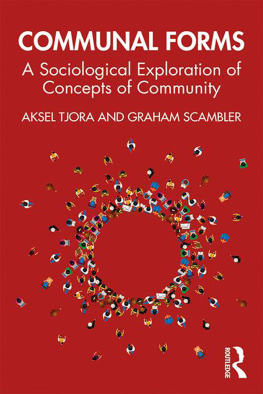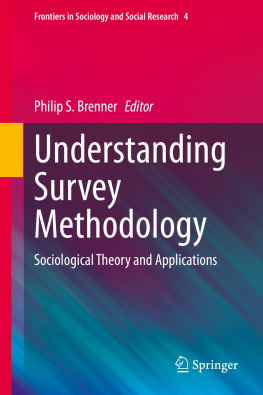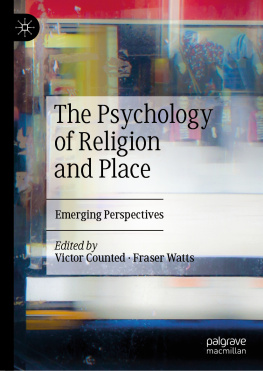ROUTLEDGE LIBRARY EDITIONS:
SOCIAL AND CULTURAL GEOGRAPHY
Volume 1
THE POWER OF PLACE
THE POWER OF PLACE
Bringing together geographical and sociological imaginations
Edited by
JOHN A. AGNEW
AND JAMES S. DUNCAN
First published in 1989
This edition first published in 2014
by Routledge
2 Park Square, Milton Park, Abingdon, Oxon, OX14 4RN
and by Routledge
711 Third Avenue, New York, NY 10017
Routledge is an imprint of the Taylor & Francis Group, an informa business
1989 John A. Agnew & James S. Duncan
All rights reserved. No part of this book may be reprinted or reproduced or utilised in any form or by any electronic, mechanical, or other means, now known or hereafter invented, including photocopying and recording, or in any information storage or retrieval system, without permission in writing from the publishers.
Trademark notice: Product or corporate names may be trademarks or registered trademarks, and are used only for identification and explanation without intent to infringe.
British Library Cataloguing in Publication Data
A catalogue record for this book is available from the British Library
ISBN: 978-0-415-83447-6 (set)
eISBN: 978-1-315-84860-0 (set)
ISBN: 978-0-415-73320-5 (Volume 1)
eISBN: 978-1-315-84861-7 (Volume 1)
Publishers Note
The publisher has gone to great lengths to ensure the quality of this reprint but points out that some imperfections in the original copies may be apparent.
Disclaimer
The publisher has made every effort to trace copyright holders and would welcome correspondence from those they have been unable to trace.
THE POWER OF PLACE
Bringing together geographical and sociological imaginations
EDITED BY
John A. Agnew
James S. Duncan
Boston
UNWIN HYMAN
London Sydney Wellington
John A. Agnew & James S. Duncan, 1989
This book is copyright under the Berne Convention. No
reproduction without permission. All rights reserved.
Unwin Hyman, Inc.
8 Winchester Place, Winchester, Mass. 01890, USA
Published by the Academic Division of
Unwin Hyman Ltd
15/17 Broadwick Street, London W1V 1FP, UK
Allen & Unwin (Australia) Ltd
8 Napier Street, North Sydney, NSW 2060, Australia
Allen & Unwin (New Zealand) Ltd in association with the
Port Nicholson Press Ltd,
75 Ghuznee Street, Wellington 1, New Zealand
First published 1989
British Library Cataloguing in Publication Data
The power of place : bringing together geographical and sociological
imaginations.
1. Social conditions. Geographical aspects
I. Agnew, John A. Duncan, James S.
304.2
ISBN 0-04-445281-0
Library of Congress Cataloging-in-Publication Data
The power of place : bringing together geographical and sociological imaginations / John A. Agnew & James S. Duncan, editors.
p. cm.
Essays based on lectures given at Syracuse University, fall semester, 1986.
Bibliography: p.
Includes index.
ISBN 0-04-445281-0 (alk. paper)
1. Anthropo-geography. 2. Social sciences. 3. Geopolitics.
I. Agnew, John A. II. Duncan, James S. (James Stuart), 1945
GF49.P68 1989
Typeset in 10 on 11 point Bembo
Printed in Great Britain at the
University Press, Cambridge
Dedicated to the memory of David E. Sopher
(19241984)
Contents
John A. Agnew & James S. Duncan
John A. Agnew
J. Nicholas Entrikin
David Ley
Peter J. Hugill
Edward Muir & Ronald F. E. Weissman
Denis Cosgrove
Vincent Berdoulay
Miles Richardson
David Robinson
James S. Duncan
Marwyn S. Samuels & Carmencita Samuels
This collection of essays is the fruit of a series of lectures given at Syracuse University in the fall semester of 1986. One purpose of the lecture series was to examine some of the uses of the concept of place in social science and history, especially in relation to questions of power and politics. Another purpose was to examine why recourse to the concept of place has been both infrequent and idiosyncratic within the confines of normal social science and history. Some essays address both purposes, if with differing degrees of emphasis. Others tend to focus on one rather than the other.
The lecture series was organized and this book is published in memory of David E. Sopher, who died in March 1984. David Sopher was a major influence upon a number of students and faculty colleagues at Syracuse University who were privileged to know and work with him. Broadly educated in a time that values narrow technical expertise, David Sopher cherished a real world of cultural variety and complexity over what he believed to be an intellectual world of universal motivations and simple laws of social behavior. It was in this context that the concept of place loomed large for him. Places provided both the real, concrete settings from which cultures emanated to enmesh people in webs of activities and meanings and the physical expression of those cultures in the form of landscapes.
By no means all of the contributors to this book knew or worked with David Sopher. In this respect it is not a typical memorial volume. But they all share a common interest in exploring and illustrating the history and uses of the concept of place. In this respect they are David Sophers intellectual heirs at a time when there is a general revival of interest in place and places at the expense of the universalizing or law-seeking social science against which David Sopher was often embattled. We only wish he were here to join in the fray.
John A. Agnew
James S. Duncan
JOHN A. AGNEW & JAMES S. DUNCAN
This book is an attempt to make the case for the intellectual importance of geographical place in the practice of social science and history. It reflects the recent revival of interest in a social theory that takes place and space seriously. Foucault (1980, p. 149) captures what is most at stake when he writes:
Space was treated as the dead, the fixed, the undialectical, the immobile. Time, on the other hand, was richness, fecundity, life, dialectic.The use of spatial terms seems to have the air of anti-history. If one started to talk in terms of space that meant that one was hostile to time. It meant, as the fools say, that one denied history. They didn't understand that [these spatial terms]meant the throwing into relief of processes historical ones, needless to say of power.
Place is a difficult word. The Oxford English Dictionary gives over three and one-half pages to it. It can mean a portion of space in which people dwell together, but it can also mean rank in a list (in the first place), temporal ordering (took place), or position in a social order (knowing your place). In modern social science the geographical meaning has been largely eclipsed by the others. In particular, the social categories of state censuses have pre-empted geographical places as the major operational units of social theory; classes and status groups have displaced places and geographical settings. In sum, sociology has transcended human geography.







